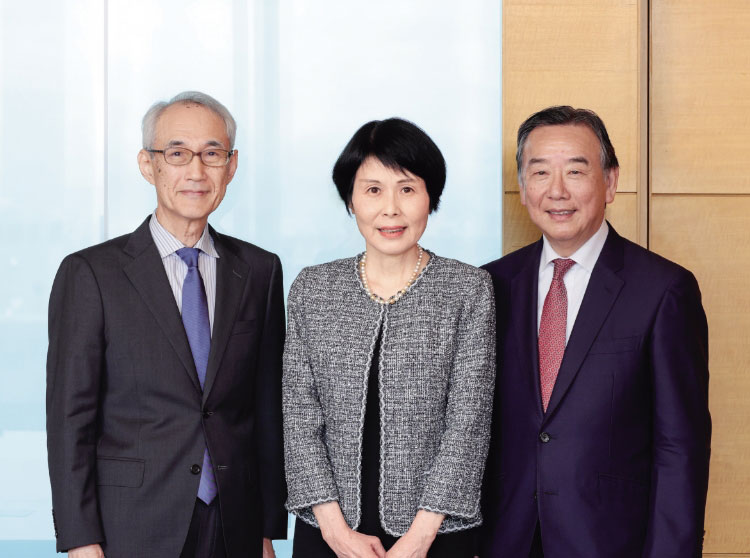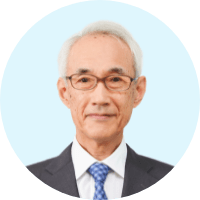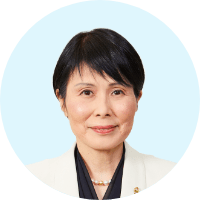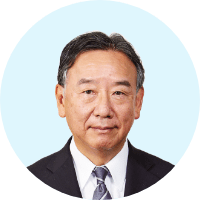
Roundtable discussion
- External Directors
- Masayuki Mitsuka
- External Directors
- Nawomi Todo
- External Directors
- Masatoshi Ohara
Monitoring and supervision that leverages specialization to achieve sustainable increase in corporate value
The Company has three external directors who are responsible for monitoring and supervising management from an outside perspective by leveraging their particular specializations. In fiscal 2023, there were multiple incidents that required difficult decisions, such as the disposal of U.S. subsidiary Upsher-Smith shares and the discovery of inappropriate Teprenone Capsules testing at the Kyushu Factory. In addition, there were lively deliberations regarding the new Medium-Term Business Plan, which was announced in June 2024. In this roundtable discussion, external directors look back at how the Board of Directors handled these issues from their particular expert perspectives.
-

- External DirectorsMasayuki Mitsuka
- Having served as the Representative Director and President of Mitsubishi Tanabe Pharma Corporation for six years, since 2014, Masayuki Mitsuka is knowledgeable of management issues faced by pharmaceutical companies. He has served as a Director of the Company since 2023.
-

- External DirectorsNawomi Todo
- Nawomi Todo is a physician and an occupational physician licensed by the Japan Medical Association. She has served as a Sawai Pharmaceutical Director since 2015 and as a Sawai Group Holdings Director since April 2021.
-

- External DirectorsMasatoshi Ohara
- Masatoshi Ohara is a lawyer and partner at Kikkawa Law Offices. He is also a licensed attorney in New York, U.S. He has served as a Sawai Pharmaceutical Director since 2019 and as a Sawai Group Holdings Director since April 2021.
Could you tell us about the deliberations and your thoughts on withdrawing from the U.S. business?
- Ohara :
-
With the usage ratio of generic drugs reaching nearly 80% in Japan, I think that following a search for a new market, management’s decision to enter the U.S. market was not a mistake. However, when the business was actually launched, price competition was fiercer than expected due to the entry of some Indian manufacturers, which was not envisioned in due diligence, and it became clear that it would be difficult for conditions to improve because of our precarious market position. Considering the situation, it is my opinion that it was a rational decision to withdraw from the market in order to avoid even greater losses.
There was one difficult aspect of the withdrawal, which was that we had to obtain the consent and approval of Sumitomo Corporation, a joint investors. But after the decision to withdraw was made, we received reports on the cautious process to limit losses as much as possible, which I appreciate.
- Mitsuka :
-
I think this was a decision that was necessary so that both the U.S. business and Japan business could grow. Under the holding company, it was difficult for the U.S. business and Japan generic drug business to mutually generate synergy because they handled different products and faced different market demands. As for the best way for each business to achieve a sound expansion in the medium and long term, it was determined that the U.S. business was more likely to grow through an alliance with Taiwan-based Bora Pharmaceuticals, which is aggressively investing in its U.S. generic drug business, than it would be by collaborating with Sawai Pharmaceutical.
On the other hand, in Japan, it is extremely important that companies of an appropriate size provide the Japanese people with quality generic drugs at an affordable price, not an excessively low price. I think that even for the Japan business, the time had come for a decision to focus the investment of business profit into the domestic business.
- Todo :
-
In the end, our reading of conditions was definitely overly optimistic, but we still retain the results and experience of this bold challenge. Even at the Board of Director meeting, I said that I want the Company to learn something from this.
What have you said about the inappropriate testing of Teprenone and related recurrence prevention measures?
- Mitsuka :
-
There are several key evaluation items related to improving quality reliability, which are managed internally by the Manufacturing Division and Quality Control Department, and I have stated at the Board of Directors meetings that I would like to see those raised to company-wide targets and included in the next medium-term business plan if possible. I want them included as quantitative non-financial targets, which I want the whole company to pursue, and for those numerical results to be communicated to customers and investors.
Another point is that, although a report on this incident was submitted to external officers, I requested that two items be clarified, the first being criteria regarding what incidents should be reported, and the second being what should be included in future incident reports. Furthermore, discussions regarding measures to mitigate the impact of various problems are moving forward as part of recurrence prevention measures.
- Ohara :
-
That is exactly right. There are two issues here. The first one is to what extent is there a system to prevent this type of incident and whether that system is properly operating. The second one is whether there is a system so that we as external directors are sure to obtain this information in a timely manner.
Let’s consider the first question. As a member of the legal profession, I have had the opportunity to be asked for advice on responding to various problems and scandals. Based on this experience, it is important to provide detailed and clear rules to prevent recurrences, and I think that the necessary measures are being taken at the workplace level, even at Sawai Pharmaceutical. However, I do not consider these steps sufficient enough and believe that it is necessary to reform the corporate culture and the awareness of employees.
As for the second issue, external officers received a report on the incident shortly after it occurred. However the issue remains that it took time to determine the causes and detailed results and to report that to the Board of Directors. In response to this incident, the Board of Directors seriously deliberated on the issue, and there have been calls for the development and construction of a system for timely reports to the Board of Directors based on an appropriate process. I think that this will correct the issue.
- Todo :
-
I also said that what occurred should have been reported first to the Board of Directors. It was an inexcusable problem. We must further strengthen initiatives to prevent recurrences as well as initiatives regarding the quality we have built up. One element of corporate governance is supervising management, which includes compliance issues, and this is one of the core roles of external directors. This incident reinforced for me the notion that this duty must be fulfilled.
- Mitsuka :
-
Currently, there is a shortage of generic drugs throughout Japan, and there are still many items with supply restrictions. Therefore, manufacturing workplaces face a lot of pressure regarding production volume. To prevent recurrences, it is extremely important that employees in production fully understand that they must both ensure quality and expand production while lowering costs, which the Company demands.
There are three key points for that understanding. First, there must be reforms of the organizational culture, as Director Ohara said. Second, the figures for important evaluation items related to improving product reliability, which each division already has, must become targets for the whole company. Finally, we must invest in equipment, systems, and people which includes factory equipment, systems that automatically record data, and employees who work at factories.
Regarding staffing, the current Medium-Term Business Plan includes plans to increase the number of employees, particularly for Quality Control Departments at factories, by about 130. However, although this has already been said, the most important point is that employees on the frontline of manufacturing understand that the company has united to give the greatest priority to the quality of its products. Without that, I am concerned that there is a risk that the same problem could occur again.

Could you tell us about the considerations and deliberations carried out in formulating the Medium-Term Business Plan?
- Todo :
-
Regarding deliberations on the Medium-term Business Plan, I noted that I would ask executive officers to focus on capturing the hearts of all stakeholders who want to support our employees and Sawai. Since taking up the position of external director, I have repeatedly said that we should communicate a clear, appealing vision. Of course, without profit, we cannot pay our employees or pay dividends to our shareholders. I believe, however, that in order to ensure the sustainability of a company, the core element lies in its vision.
- Ohara :
-
As for figures, I think it is important to take a close look at the evidence that a target is achievable. Therefore, when deliberating on the new Medium-Term Business Plan, I expressed the opinion that we have to incorporate things that the company should be sure to implement based on figures grounded in reality, not forecasts of how we want things to be. I truly feel that during recent Board of Directors deliberations, not only those for the Medium-Term Business Plan, we have made quite good progress in examining things from a perspective of whether it is an effective use of capital.
- Mitsuka :
-
I think that non-financial indicators—that is, ESG related items—are extremely important. In particular, governance and sustainability issues are directly linked to the continuity of the generic drug business, our core business, and sustainable earnings growth. Building a strong governance system, manufacturing products in a stable manner, guaranteeing quality, collecting safety information, and supplying numerous products without shortages — for us, these efforts are directly tied to medium-term profits. Even for indicators that do not appear to be directly linked to finances, I believe that setting targets and being sure to improve efforts ultimately leads to profits.
The government also recognizes companies that are making efforts to ensure quality and stable supply, which is also reflected in NHI drug prices. This means that the government will help ensure that our ESG efforts lead to increased profits in the medium term. Because this is a business for which it is easy to make the case that contributing to society is linked to growth as a company, it is important that we actively communicate this to society.
- Todo :
-
This means that the reason of the company’s existence is aligned with generating a profit.
- Mitsuka :
-
For example, it would probably be good to have an ESG briefing after the Medium-Term Business Plan briefing. This would be regarded highly by people, and if we can build that reputation every year, we can link it to employee satisfaction and pride among employees and employee engagement with the company.
- Todo :
-
Pride is necessary. Pride can be said to be the source of sustenance for life.

What do you think about the orientation of efforts to reinforce governance and the human asset strategy that the Company is aiming to implement?
- Mitsuka :
-
In terms of governance, our greatest priority should be strengthening the functions of the Board of Directors. Quite a while ago, we diligently worked to comply with the corporate governance code, and we are working to gradually make improvements every year.
We have also built a system that will, starting this time, use an external organization to evaluate the effectiveness of the Board of Directors. I believe this will produce quite a large amount of data that can be compared to our competitors. I think that using this data to run through the PDCA cycle to decide how to improve the necessary items and then communicating that to people outside the Company will make it easier for people to understand how we are reinforcing governance.
Another point I would like to stress is that human capital is extremely important in our business. Unfortunately, there continues to be a high turnover rate, particularly at manufacturing workplaces. When frontline workers are asked about this, they say that they are busy working in a difficult situation. I think that it is important to encourage people to work for the Company for a long time and to develop an environment in order to improve conditions and raise employee skills.
- Ohara :
-
For human resources-related issues, it is extremely important to utilize diverse human resources. We continue to welcome experienced people from various companies through mid-career hiring, but it will become important to have an HR policy that develops people from within the Company, rather than just human resources from outside the Company.
- Todo :
-
I have always said that we need to take our time and develop all employees, not only women, within the company. I also believe that one of our most important issues is to have female directors and executive officers from within the Company.
- Mitsuka :
-
Our Group makes aggressive use of mid-career hires, and many members of management joined the Company as mid-career hires. I think that the Company already has diversity in know-how and experience. This raises several questions. To what extent can we match them with employees who have worked at the company for many years, and to what extent can we make the most of them by developing their skills? How can we match them to the management strategy and HR strategy outlined in the current Medium-Term Business Plan? I would like executive officers to actively explain these points.
- Ohara :
-
Fortunately, each external director has a different area of expertise. We have Director Todo, who is knowledgeable about healthcare, and Director Mitsuka, who is well-versed in business, particularly pharmaceutical companies. As a lawyer, I am well informed of legal issues, trends, and cases outside the company and express my opinions from a governance and compliance perspective. I believe that not only internal deliberations and perspectives but also Board of Directors discussions that include a broad range of diverse opinions based on different areas of expertise will be beneficial for the company.
Download all pages
- For printing (A4-size)
All single pages PDF (7.7MB) - For viewing (A3-size)
All facing pages PDF (10.5MB)
Download in sections
Download separate volume of Financial section
- For printing (A4-size)
All single pages PDF (2.4MB) - For viewing (A3-size)
All facing pages PDF (0.8MB)
Back issues
- Year Ended March 31, 2023
- Year Ended March 31, 2022
- Year Ended March 31, 2021
- Year Ended March 31, 2020
- Year Ended March 31, 2019
- Year Ended March 31, 2018
- Year Ended March 31, 2017
- Year Ended March 31, 2016
- Year Ended March 31, 2015
- Year Ended March 31, 2014
- Year Ended March 31, 2013
- Year Ended March 31, 2012
- Year Ended March 31, 2011
- Year Ended March 31, 2010
- Year Ended March 31, 2009
- Year Ended March 31, 2008
- Year Ended March 31, 2007
- Year Ended March 31, 2006
- Year Ended March 31, 2005
- Year Ended March 31, 2004
- Year Ended March 31, 2003
- Year Ended March 31, 2002
- Year Ended March 31, 2001
- Year Ended March 31, 2000


